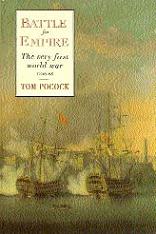
Battle for Empire
Tom Pocock
272 pages including index
published in 1998
It was described by Winston Churchill as the very first world war, with war raging between France and Britain for supremacy not just in Europe, but worldwide. Fighting between the two sides took place in Europe, North America and the Caribbean, India and even the Philippines. It was the Seven Years' War. And even though it was one of the wars that is at the root of the modern world, according to Tom Pocock, it's largely a forgotten war, especially those parts of the war that took place outside Europe. To rectify this Pocock wrote this book, Battle for Empire; he may have had somewhat of an ulterior motive, as one of his ancestors, vice-admiral Sir George Pocock, was one of the major participants in these events...
This then is not a history of the Seven Years' War as a whole, but strictly the story of several of the major campaigns in the war outside Europe: the battles between Britain and France in India, the English invasion of Quebec and New France in America, as well as the expeditions against Spanish held Havanna and Manilla. Together they show how wide the war raged and how bold the British waged it. Little context is given to the wider war in which these campaigns took place, even less of the reasons for the war.
Not that these reasons were very complicated, no matter the direct cause. Britain and France were the two greatest powers in Europe, direct competitors not just there, but also in North America and India, where each thought the other's succes might threaten their position. The economic and political circumstances made a war for supremacy inevitable. Britain won and would become a superpower, while France declined, no longer able to challenge Britain on a worldwide scale anymore, though still able to cause it grief in Europe. That's why this war was waged in the colonies as well as in Europe, because in large part it was about who would become master of India and North America.
Pocock starts his book by estblishing this context, then opens it proper with the story of the unfortunate admiral Byng, court-martialed and condemned to death by firing squad for "failing to do his utmost" during the Battle of Minorca, at the start of the Seven Years' War. He was immortalised in the famous line of Voltaire's, in Candice: "Dans ce pays-ci, il est bon de tuer de temps en temps un amiral pour encourager les autres". This controversial decision would play a role in determining some of the actions taken by British commanders during the war, afraid to share Byng's fate.
This was especially true in India, where much of the fighting was at sea, with Britain and France attempting to achieve naval supremacy in the Indian Ocean in order to be able to block the other's colonies and trading posts. On land, the armies of both sides was small, especially when it came to trained, European soldiers. On land both sides also had to deal with unreliable Indian allies. The British had even lost Calcutta to the Nawab of Bengal, before hostilities with the French in India even started and had to deal with him first. At sea meanwhile a series of indecisive clashes between the French and English slowly saw the latter, despite their numerical inferiority, gain the upper hand, after which the land campaign proper could start.
In North America, the British plans were amibitious: a series of three separate invasions: two aimed at Quebec, the capital and a third, smaller one at Fort Duquesne, aimed at breaking the ring of forts and settlements France had constructed to the west of the English colonies, cutting them off from expansion in that direction. This latter failed, but the two other invasions succeeded and meant New France would be added to the English colonies in North America.
Describing these campaigns in India and America take up the first two thirds of Battle for Empire, with the remainder of the book being given over to two later expeditions: the attacks on Havanna and Manila, to strike at the heart of the Spanish colonial empire in the Americas and the Pacific. Spain had at first been neutral in the war, but by 1762 it had entered it on the side of France. Hence these expeditions, which were launched from England itself, the most succesful ambitious expeditions until the D-Day landings in 1944... Unfortunately I got the distinct impression Pocock wasn't as interested in these expeditions as in the earlier campaigns, or did not have the room to do them justice, especially the battle for Manila. Then again, these campaigns were both shorter and much more straightforward, so perhaps there just was less to tell about.
In general, this was an interesting look at some undeservately forgotten military campaigns, just don't mistake it for a general history of the Seven Years' War, as the cover is trying its best to convince you it is. Pocock is a skilled narrator, keeping your interest up, if at times somewhat hazy on details. He's also very much on the side of the British and portrays events solely from their point of view.
Read more about:
Tom Pocock,
Battle for Empire,
Tony Blair,
UK foreign policy,
book review